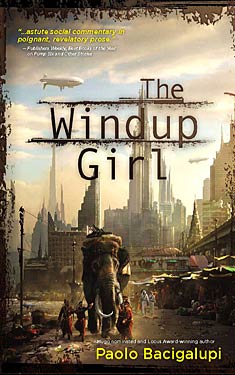The Windup Girl
The Windup Girl was a difficult novel to read. Not because it took place in the future, with all kinds of futuristic stuff to describe, and futuristic lingo that you have to learn. It’s the past that made this a tough nut to crack for me. Specifically, Thailand’s past
This novel, taking place in a vague future that could be a thousand years from now, or twenty years away, takes place in the city of Bangkok, or what used to be Bangkok, I’m not sure. The novel goes right into the story, and doesn’t belittle the reader with a “catch up,” but rather gets right into it, assuming that you’ll get the hang of it as you go along. Normally, I like when this is done, such as in A Clockwork Orange, when you are just expected to pick up the local slang in which the novel is written. It allows the reader to be completely immersed into the world that the author has created, making it that much more vivid
In this case of The Windup Girl, Bacigalupi is attempting to immerse the reader into the Thai culture, which in many ways, is more foreign than the frightening future England that Burgess painted in the aforementioned dystopian novel. Many of the pro-words are Thai or Cantonese, and the novel constantly refers back to the past of Thailand, expecting the reader to have a grasp of the history, their gods, their profits, and many, many other references that I had no clue about, making it very difficult to follow the story, since much of the tensions were based on the history of the country.
Now, much of it was based on false history. That is, the history in-between our present day, and the unnamed time in which Bacigalupi’s world takes place. But I gathered that much of it was even further back, into our shared (ours and the novel’s) history, and with no knowledge of the region’s history or culture, I just… didn’t get it.
This is the negative beginnings for me of the book, so now let me give it some praise. Despite the difficult (or at least often incomprehensible) read, I hung in there, and what I got was a good story, with very developed characters, who seemed believable in their motivations and their individual quests. Character development is one of Bacigalupi’s strong suits, here. The Windup Girl herself, while seemingly not the main character, is none-the-less pivotal, and though she seems pathetic and one-dimensional at first, over the course of the story, more and more depth is added until at the end, you have a character worthy of rooting and hoping for.
You want things to work out for many of the characters in the novel, and in the end, you mostly get just that. The ending, which I won’t go into, all clicked together to make it a book worth spending your time on. Should a sequel be written, I hope that it goes further into the Japanese culture only glimpsed in the story. That was the main aspect of the novel that I was interested in, and that’s what I’d like to see more of.
I give The Windup Girl 8 out of 10.



















 Full Details
Full Details



1 Comment
When I started reading the book, I was initially quit agitated. The paucity of background, the presumptions of knowledge and jaundiced understanding of Bacigalupi’s world was a tough nut to crack, made ever more strenuous by the use of Thai elucidations where conventional English would have sufficed. Once I became accustomed to his style, and discovering his world as represented in the short stories "The Calorie Man" and "Yellow Card Man" I became more acquainted with the world and its characters, and was ultimately quite doleful when I finished it. There certainly is enough material and bouncing loose ends for a follow-up story.For me the overarching theme is one of greed that spreads its tentacles deep into the novel. Corporate greed and individual greed, the like. Each character wants something or another, including the Windup Girl. I indubitably enjoyed the augmentation of the subdued character of Kanya into the "new" cantankerous and rapacious Tiger of Bangkok, and was pleasantly surprised how she turned out. Also Emiko’s development was creditably written, leaving a few unanswered questions about her origin and true purpose.It is a good enough. Somehow, considering all the media adduce around, I expected a bit more. I knew halfway through "The Road" that I’ll be given it a perfect score, but can’t as yet quantify properly why "The Windup Girl" only gets an 8 from me. There are some problems – perhaps my uneasiness lies within the complex plot and arguably much of the unfinished business left at the end. Different to "The Forever War", I certainly agree with your rating here 😉
Sorry, the comment form is closed at this time.